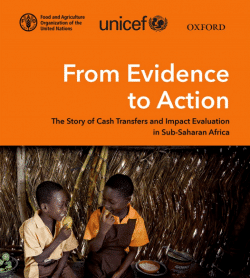
Policy highlights:
- To improve effectiveness of cash transfer programmes in sub-Saharan Africa (SSA), it is not only important to understand the programmes’ impacts, but also the processes that facilitate their continued improvement, such as evaluation and monitoring.
- This book focuses on impact studies of cash transfer programmes implemented in eight SSA countries: Ethiopia, Ghana, Kenya, Lesotho, Malawi, South Africa, Zambia and Zimbabwe.
- The policy-relevant conclusions include: 1) unconditional cash transfers lead to significant social and productive impacts on beneficiary households; 2) cash transfers make people happier and give beneficiaries hope, a precondition for families to want to invest in the future; 3) cash transfer programmes have a strong and consistent impact on school enrolment, resulting in an increase of 5 to 15% secondary school enrolment; 4) across all nations, cash transfers enhance food security and health levels; 5) cash transfers lead to improved ability to manage risks and have significant multiplier effects in the local economy.
- Additionally, the study showed that a systematic and thorough impact evaluation of cash transfer programmes yielded positive results. Evidence showed that the evaluation: 1) built credibility of an emerging social protection sector; 2) strengthened the case for social protection as an investment; 3) informed programme improvements in key areas such as targeting, access, transfer size, and the role of complementary activities; and 4) shaped policy discussions beyond the national context and informed regional social protection agendas.






